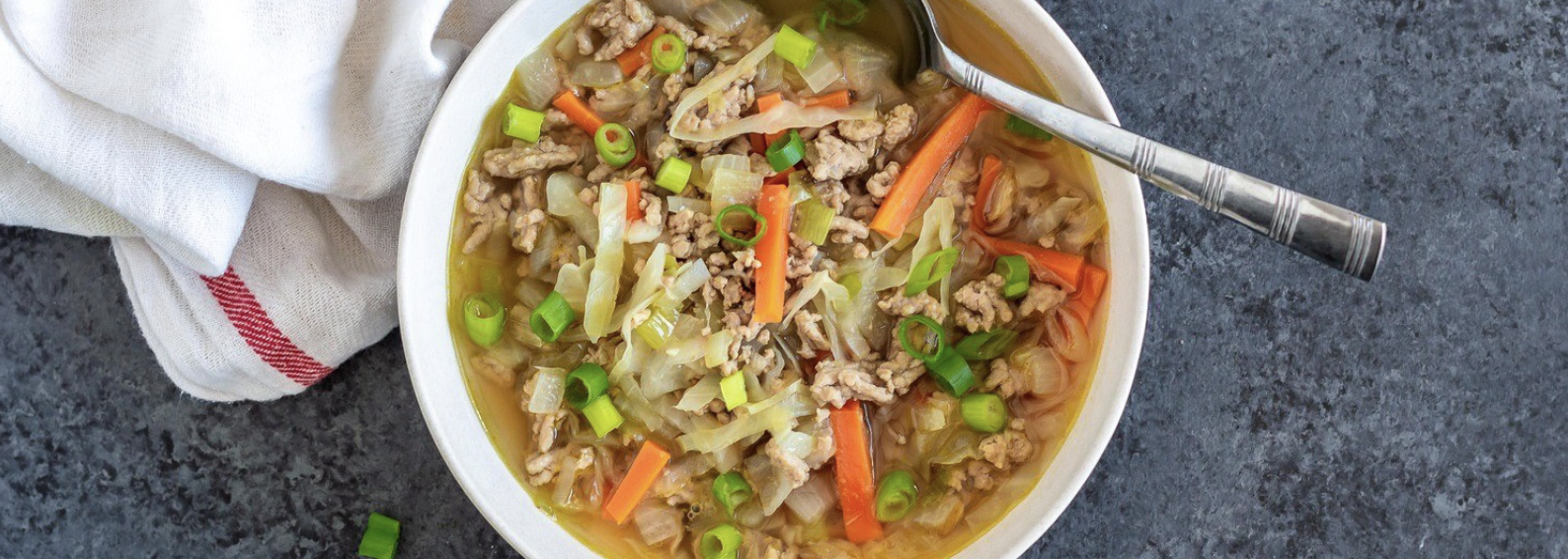Paleo Pork and Cabbage Soup
Ingredients:
1 lb Ground Pork, pasture-raised
1 TBSP Coconut Oil
1 Yellow Onion (chopped)
2 Garlic Cloves (minced)
1/2 TSP Ground Ginger
1 Carrot (large, cut into matchsticks)
3 cups Green Cabbage (sliced thin)
6 cups Chicken Broth
1 TBSP Coconut Aminos
2 Stalks Green Onion (chopped, plus more for garnish)
Directions:
Heat a large pot over medium heat. Add the pork to the pan, breaking it up as it cooks. Once it is cooked through transfer it to a plate and set aside. Drain any excess drippings from the pan.
Add the coconut oil to the same pot. Add the onions and cook for about five minutes or until the onions begin to soften. Add the garlic and ginger. Continue to cook for another minute.
Add the browned pork back to the pot and then add the carrots and cabbage and stir to combine. Add the chicken broth and bring the soup to a gentle boil. Continue to cook for 15 to 20 minutes or until the carrots and cabbage are tender.
Stir in the coconut aminos and green onion. Season the soup with additional salt if needed. Divide between bowls and garnish with additional green onion (if desired). Enjoy!
Notes:
Leftovers: Refrigerate in an airtight container for up to three days.
Serving Size: One serving is approximately equal to two cups of soup.
More flavor: Use fresh ginger instead or use sesame oil instead of coconut oil.
Additional toppings: Bean sprouts, cilantro, and/or sriracha
More veggies: Add mushrooms, celery or kale
No pork: Use pastured ground chicken or turkey instead
Want more recipes like this one? Grab my Paleo Soups and Stews Recipe Book here!
This Paleo Pork and Cabbage soup is a delicious and healthy meal that features nutrient-dense ingredients known for their healing properties. Find out how each ingredient will nourish you below:
Ground pork from pasture-raised sources can provide a good source of protein and essential nutrients such as vitamin B12, zinc, and selenium. It can be a flavorful addition to the soup and contributes to satiety.
Coconut oil is rich in healthy saturated fats, specifically medium-chain triglycerides (MCTs). MCTs are easily digested and can provide a quick source of energy. Coconut oil also contains lauric acid, which has potential antimicrobial properties.
Yellow onions are a good source of antioxidants, particularly flavonoids, which have been associated with various health benefits. Onions also contain vitamin C, fiber, and prebiotics that support gut health.
Garlic contains a compound called allicin, which has been associated with antimicrobial and immune-boosting properties. Garlic may also have cardiovascular benefits and potential anti-inflammatory effects.
Ginger has been used traditionally for its anti-inflammatory and digestive properties. Ginger may help reduce nausea, alleviate gastrointestinal discomfort, and possess antioxidant effects.
Carrots are rich in beta-carotene, which is converted into vitamin A in the body. Vitamin A is essential for maintaining healthy vision, supporting the immune system, and promoting skin health. Carrots also provide dietary fiber and other antioxidants.
Green cabbage is a good source of vitamins C and K and contains antioxidants that help protect against cellular damage. Cabbage is also low in calories and provides dietary fiber, which supports digestive health.
Chicken broth can be rich in collagen, gelatin, and amino acids. It may also contain minerals like calcium, magnesium, and phosphorus, depending on the preparation method.
Coconut aminos is a popular substitute for soy sauce and adds a savory flavor to dishes. It is made from the sap of coconut blossoms and is gluten-free and soy-free. Coconut aminos contain amino acids and may provide a lower-sodium alternative to traditional soy sauce.
Green onions, also known as scallions, add a mild onion flavor and vibrant color to dishes. They are a good source of vitamin K and vitamin C. Green onions also contain antioxidants and may have potential anti-inflammatory properties.

